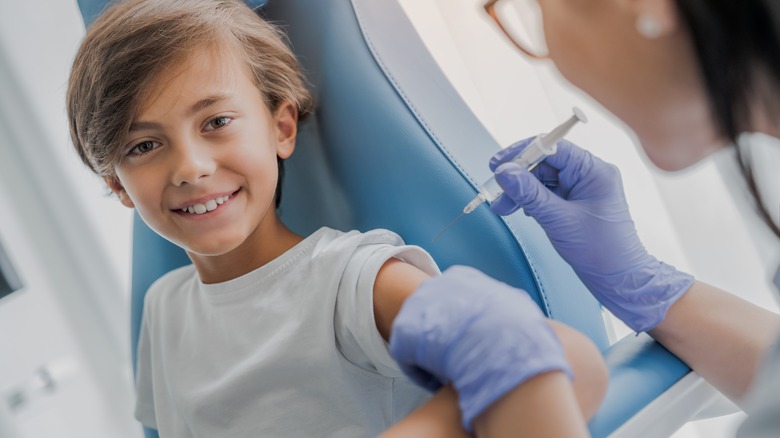What The Chickenpox Vaccine Has Accomplished Since Its Introduction In 1995
When you think of chickenpox, you might think of a mildly irritating rash that young kids used to get. But in fact, the chickenpox disease used to send over 10,000 people to the hospital each year, causing around 150 deaths and infecting more than 4 million people every year, as per the Centers for Disease Control and Prevention (CDC). Nowadays, those numbers are practically nonexistent, and it's all thanks to the chickenpox vaccine.
Chickenpox is caused by the varicella-zoster virus, usually presenting as an itchy rash that appears 10 to 21 days after exposure to the virus (via Mayo Clinic). It lasts for between five and 10 days and might be accompanied by fever, headache, fatigue, and appetite loss. Typically the rash will first appear as red bumps, then can become pus-filled blisters that pop open and scab over. It's extremely contagious and usually mild in healthy children, but can be severe for some. Once you have chickenpox, the virus lives dormant in your cells. As an older adult, you're then susceptible to the virus resurfacing as shingles, a disease similar to chickenpox. Keep in mind, shingles is often accompanied by severe pain.
Luckily, in 1995, a vaccine for chickenpox was added to the childhood immunization schedule, followed by the booster shot in 2006 (via The College of Physicians of Philadelphia).
Years later, it's clear the vaccine is a success
Fortunately, the vaccine works really well. In fact, a new analysis of national databases released by the CDC showed that cases of chickenpox in those under 20 years old have dropped by 97% as of 2019, years after the introduction of the vaccine. Hospitalizations have been reduced by 94% and deaths by 99%. Dr. Mona Marin, an epidemiologist at the CDC's National Center for Immunization and Respiratory Disease and the lead author of the study, called the vaccine a monumental success (via NBC News). She said that between 2012 and 2016, there were no chickenpox-related deaths.
And this may be good news in terms of shingles, too. While it's too soon to have enough data on the risk of shingles in older adults, experts expect that the risk of the disease will be practically nonexistent, if people continue to get vaccinated. As of now, about 90.3% of children have gotten the chickenpox vaccination by age two.
The U.S. Advisory Committee on Immunization Practices recommends getting the first dose at age one, followed by a booster dose around the ages of four and six (via The College of Physicians of Philadelphia). It's also now available as part of a combination vaccine with measles, mumps, and rubella, known as MMRV.


